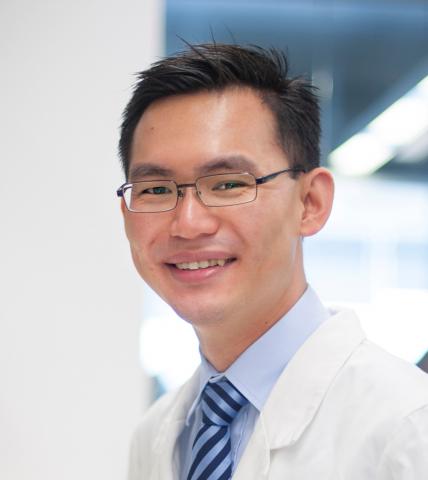
Dr Edward Chew is a clinician and medical scientist at The Royal Melbourne Hospital.
In 2018, Edward was selected to take part in Melbourne Genomics’ Medical Specialists Immersion Program. His project explored how to integrate haematology and clinical genomics and how this can improve patient care.
We asked Edward a few questions about his project.
Tell us about yourself.
I am a haematologist completing my PhD at the Walter and Eliza Hall Institute of Medical Research where I investigated the genetic drivers predisposing to acute myeloid leukaemia (AML) and its resistance to therapy. During my PhD, I discovered a novel inherited predisposition to AML in an Australian family and became interested in how clinicians can better apply genetic/genomic research findings to help patients.
Tell us about your project with Melbourne Genomics. What was your ultimate goal?
Inherited predispositions to haematological cancers are rare. In contrast to the genetics/genomics of breast cancer, bowel cancer and sudden cardiac death where genetics and genomics have good utility, there is little clarity about who and how patients suspected to have an inherited risk of haematological cancers like AML should be assessed.
My aim was to learn how to incorporate genetics and genomics in clinical practice, so I sought an understanding of how a clinical genetics service functions and how this can be applied in my own specialty. With the support of Melbourne Genomics, Professor Ingrid Winship and Associate Professor Paul James, I was able to attend clinics at the Victorian Comprehensive Cancer Centre’s (VCCC) Familial Cancer Clinic.
What did you learn?
I was included in the clinical team, so I learned how to assess patients in the context of families, co-ordinated their genetic testing, interpreted genetic variants and discussed the results with patients and their family. It was a fully ‘immersive’ experience where I learned how to use genomics as the basis of risk assessment, and subsequent evidence-based risk management.
In addition to enhancing my clinical skills in medical genomics, I also learned to ‘curate’ genetic variants to determine their significance and utility in caring for our patients and their families.
Even though the human genome was sequenced in 2003, there remains much that we do not understand: for example, how do different types of genetic variants impact the function of different genes? It was a great experience learning how variants may (or may not) be clinically significant, whether the variant is truly of uncertain significance and what that means in the care of patients. In some cases, it felt like the more I learnt, the more there is to learn!
By immersing myself in the activities of the unit, I appreciated how a clinical genetics service works and the roles of different members of the multidisciplinary team. Despite being a fully qualified haematologist and pathologist, the clinical genetics team have members with unique skill sets that I would not have known about nor had the benefit of such close working relationships.
Why is this area of research important?
Despite how rare inherited predispositions to haematological cancers are, there is an urgent unmet clinical need for identifying these patients. It impacts how we care for these patients and their families. Also, as we learnt from breast cancer with BRCA gene mutations or bowel cancer with APC mutations, patients with rare genetic disorders often provide valuable insight into the basic genetics of cancer.
The experience and expertise in other heritable cancers will create a good model for investigating individuals with possible heritable haematologic malignancies and their families.
How has the research project helped your career and how will it help the field of genomics? How has the project influenced your future research career?
My experience through the Melbourne Genomics Health Alliance Fellowship has reaffirmed my view that there is a clear need in Australia for more clinical genomics expertise in haematology. My experience at the Familial Cancer Clinic was intellectually and clinically satisfying and inspired me to gain additional experience.
My experience and the opportunity provided by Melbourne Genomics were pivotal in my awards, in 2019 of the VCCC Picchi Prize and the Victorian “veski” Prize to visit the laboratory and clinical service of Professor Lucy Godley in Chicago, USA. Professor Godley is a world leader in inherited predispositions to haematological cancers. Hopefully, upon my return I will be able to use the additional experience and international contacts to better help the haematology patients in Australia.
